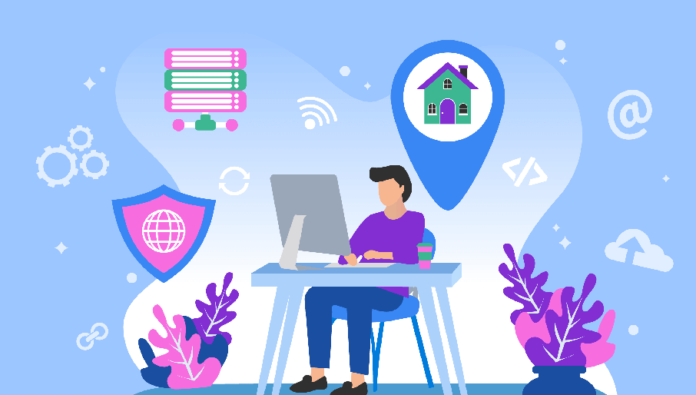Social media has revolutionized the way we market our products and services. According to HubSpot, as of October 2021, 4.55 billion people are active on social media; that’s more than half (56%) of the global population! If you want to attract leads, traffic, and sales, it’s essential to have a social media marketing/content creation team. However, a problem arises when multiple people simultaneously use or log in to a social media account. In this article, you will learn how to overcome this problem by learning about residential proxies – what they are, why you should use them, how to use them, and the difference between a datacenter and residential proxies. Without further ado, let’s get started.
What’s the Problem? | Social Media Restrictions
Nowadays, social media sites have heavy restrictions on third-party applications, logins, and account creations or sign-ups to prevent fraud. These restrictions become a big problem when we want to create multiple social media accounts to show presence and activity but are blocked from doing so; This also affects businesses that require numerous social media accounts. Below is a list of the dangers of using the same device or IP address to manage your social media accounts.
- Multiple accounts on the same IP address or device might get deleted.
- Your ISP has a reason to block you.
- Social media platforms might shadowban you (they ban you but don’t inform you about it).
What Are Residential Proxies?
Residential proxies are crucial in preventing these restrictions from causing significant problems. Proxies enable you to hide your identity by allowing you to ‘virtually’ login to from any location from any device; this enables you to manage your social media accounts without worrying about being blocked or banned. At its core, social media residential proxies are responsible for redirecting your connection to by-pass from social media platforms.
How Do You Use Residential Proxies for Social Media?
To use a residential proxy, you first need to find one. This step is crucial since you don’t want to redirect your connection and sensitive information to a malicious proxy server. Most of the time, residential proxies are given out by an application/software. Whichever way you get a proxy, there are things you must watch out for; below is a list of things you should be checking for when searching for a residential proxy.
- Terms of Service (the fine print) – Most people skip the fine print out of habit since what’s the worst that could happen? However, the worst really could happen if you don’t look out in this case. Sensitive information such as passwords, names, and more can be released into the internet, and once it’s out there, it can’t be taken back. This is why reading the fine print should be taken seriously.
- Domain Age – Go to whois.domaintools.com – a database to check domain status. The older your domain, the better it will be since it’s proven the test of time against social media restrictions. As a rule of thumb, look for domains at least two years old.
- Privacy – Don’t ever use a public proxy since it is not secure and will cause major headaches in the future. Instead, look for proxy servers that are private to your IP address only.
The Difference Between Datacenter Proxies and Residential Proxies
Datacenter Proxies are IP addresses that come from data centers which means that they are not associated with ISPs; they are fast, stable, and cheaper than its counterpart; residential proxies are provided by ISPs to homeowners, which can provide a separate IP address to someone’s laptop, phone, smartwatch, etc.; they are hard to detect and allow for hundreds of simultaneous connections without complication.
Both options are great for web scraping, buying limited edition items, and, most importantly, automating social media accounts. Residential proxies are recommended for social media teams because their benefits outweigh their overall downsides. Below is a comparison table explaining the benefits and downsides of both options.
| Datacenter | Residential | |
| Speed | ✅ | |
| Stability | ✅ | |
| Price | ✅ | |
| Locations | ✅ | |
| Performance | ✅ | |
| Ease of Use | ✅ |
- Speed – Data centers will always be faster than residential IPs. Data centers have more capable hardware that can beat everyday personal devices and a faster internet connection.
- Stable – Data centers are always more stable since we don’t have to rely on predictable user behavior; Internet connections are also more stable.
- Price – Data centers are also easier to get than their counterpart, making them more affordable.
- Location – Residential proxies have more locations since it’s costly to get data centers available across the world. It requires vast hardware, a stable internet connection, and staff to maintain it. But residential proxies can be provided to anyone, anywhere, and anytime.
- Performance – Contrary to the beefy hardware of data centers. Residential proxies perform better because data centers can’t act like humans. Therefore, the chances of being blocked through a data center proxy are higher. And even worse, datacenter proxies come in groups of other proxies called subnets, which creates a high risk of getting all proxies blocked. Sometimes, a social media site can stop the whole subnet at once.
- Ease of Use – Residential proxies are also easier to use. Most of the time, residential proxies are provided by businesses that offer you software with an easy-to-use user interface.
Conclusion
In conclusion, you learned what problems social media restrictions can create, what residential proxies are, how to use residential proxies to bypass social media restrictions, what to look for in a residential proxy, and the difference between data center proxies and residential proxies.











![Extratorrents Is Down : Here Are The Best Alternatives To Extratorrent Top 14 ExtraTorrent Alternatives + 12 Mirror Sites [Updated 2020]](https://www.todaytechmedia.com/wp-content/uploads/2020/02/featured-100x70.jpg)